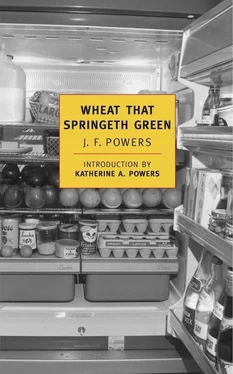J. Powers - Wheat That Springeth Green
Здесь есть возможность читать онлайн «J. Powers - Wheat That Springeth Green» весь текст электронной книги совершенно бесплатно (целиком полную версию без сокращений). В некоторых случаях можно слушать аудио, скачать через торрент в формате fb2 и присутствует краткое содержание. Год выпуска: 2000, Издательство: NYRB Classics, Жанр: Современная проза, на английском языке. Описание произведения, (предисловие) а так же отзывы посетителей доступны на портале библиотеки ЛибКат.
- Название:Wheat That Springeth Green
- Автор:
- Издательство:NYRB Classics
- Жанр:
- Год:2000
- ISBN:нет данных
- Рейтинг книги:5 / 5. Голосов: 1
-
Избранное:Добавить в избранное
- Отзывы:
-
Ваша оценка:
- 100
- 1
- 2
- 3
- 4
- 5
Wheat That Springeth Green: краткое содержание, описание и аннотация
Предлагаем к чтению аннотацию, описание, краткое содержание или предисловие (зависит от того, что написал сам автор книги «Wheat That Springeth Green»). Если вы не нашли необходимую информацию о книге — напишите в комментариях, мы постараемся отыскать её.
Wheat That Springeth Green — читать онлайн бесплатно полную книгу (весь текст) целиком
Ниже представлен текст книги, разбитый по страницам. Система сохранения места последней прочитанной страницы, позволяет с удобством читать онлайн бесплатно книгу «Wheat That Springeth Green», без необходимости каждый раз заново искать на чём Вы остановились. Поставьте закладку, и сможете в любой момент перейти на страницу, на которой закончили чтение.
Интервал:
Закладка:
16. PRIESTLY FELLOWSHIP
WHEN JOE DISCOVERED that surplus sod couldn’t be returned for credit, he had put it down alongside the church, over the so-called flower beds — petunias, just a lot of dirt, really. And now he could walk in what shade there was during the last Mass on Sunday, read his office, and keep an eye on the parking lot. “The story is told…” And when the church windows were open, he could catch the sermon. He had heard Bill earlier, and now Father Felix was on. “Troubled by poor Mass attendance in one of his villages, the old duke, traveling incognito, wearing an overcoat, or cloak, buttoned up to his chin, arrived at the village in question just as the church bells were summoning the faithful to worship, yes, and just as the others were sitting down to a long table in the bar, or Keller , of the inn, or Gasthaus , where the old duke, tipped off by the local clergy, had known he’d find them at that hour. Asked to join them at the table — little did they know — the old duke seated himself beside what appeared to be the leader, an imposing individual, before whom was set an enormous jorum, or basin, of brandy, or schnapps, but with no ladle, glasses, cups, or steins. You see, at that time, in the Duchy of Brunswick, or Braunschweig, now part of Germany, it was the custom for friendly groups to drink from the same receptacle, in this case a jorum, or basin — a good idea, rightly understood, in that it made for communitas , or community, but in this case, of course, no, far from it. Well, after taking a big swallow from the jorum, or basin, the leader handed it to the old duke, saying, as was the custom, ‘Pass that to thy neighbor.’ The old duke did as directed (after only pretending to take a swallow), saying, as was the custom, ‘Pass that to thy neighbor.’ In due course, the jorum, or basin, came back to the first man, the leader, an imposing individual, who sent it on its way again, after taking a swallow, another big one. Again, the old duke only pretended to drink. And so it went, the jorum, or basin, going round and round the table until, finally, the old duke, furious, unbuttoning his overcoat, or cloak, and thus revealing his well-known uniform and insignia to the company, struck the leader with all his might, saying, ‘Pass that to thy neighbor! And let thee beware and likewise any other here who striketh not his neighbor with all his might, for I will make an example of him and thee!’ Well, the old duke’s word was law, and blows fell hard and fast (none, of course, on the old duke) all around the table. Bim! Bam! Pow! At length, the old duke was satisfied with the penance he’d exacted (with good reason, need I say?) and departed for his castle, or Schloss . On the following Sunday, my good people, and on all the following Sundays in the old duke’s lifetime, in that village, and in villages throughout his realm, attendance at Mass, it is said, and also at Vespers, was one hundred percent.”
While Father Felix took it from there, Joe moved out of range, into the sun. Pausing before a little pile of cigarette butts in the gravel of the parking lot, he thought of inspecting the ashtrays of the nearest cars, thought again, and moved on, thinking, As this church is the house of God, my good people, so this parking lot is —forget it. “You’re good people,” he called out to a young couple heading for the church. “Good and late.” No response. People weren’t what they used to be. Formerly able to take and even enjoy a little friendly needling from their pastor, like the customers in a nightclub where an insulting waiter is part of the show, people were touchy nowadays. They wanted their “rights.” They wanted a priest to act like a minister, to thank them for showing up—“So nice to see you,” “So glad you could come”—and still they emptied their ashtrays in his parking lot.
Joe entered the rectory by the back door, washed his hands at the kitchen sink, slipped into his illustrated apron (gift of a parishioner), which he wore inside out over his cassock so the funny stuff was hidden, and set about making Father Felix’s breakfast.
When Bill, on his way over to church to help Father Felix with Communion, passed through the kitchen, Joe looked up from the breadboard, from sawing an orange, and said, “This isn’t for me”—what he’d said to explain his continuing presence in the kitchen on Bill’s first Sunday morning in residence, and what had since become a family joke, something to say when making another drink, when not declining dessert, or having a second — and when Bill went out the back door Joe intoned, “The story is told…” Another family joke. So far, there were just the two, but there should be more in time.
Father Felix sailed through the kitchen in his forest-green habit and sat down for his breakfast — or brunch, as he sometimes called it with a chuckle — in the dining room. (Joe and Bill had breakfast in the kitchen on Sunday, in Mrs P.’s absence, but Joe felt that Father Felix deserved better, as a man of the old school and as hard-to-get weekend help.) After serving him, Joe sank down at the other end of the table with a cup of coffee (what he really wanted was a cold beer). “How’s everything at the Big House, Father?”
“About the same.” Father Felix helped himself to the strawberry preserves, praising the brand, Smucker’s. He preferred strawberry to red raspberry, he said, and red to black raspberry, as a rule, and didn’t care for the monastery stuff these days, as the nuns (who spent too much time in supermarkets) went in for short cuts, skimped on the natural ingredients. “And make too much plum.”
“That so?” Joe had heard it all before. As a rule, he didn’t sit with Father Felix at breakfast.
“My, but those were fine berries.” Father Felix was referring, Joe knew, to some strawberries no longer grown at the monastery. “Little Scarlets. Small, yes, but with a most delicate flavor. And then Brother, he went and dug ’em out.”
“Brother Gardener?” said Joe, as if in some doubt.
Father Felix, carried away by anger, could only reply by nodding.
“More toast, Father?”
“All right.” Father Felix helped himself to more preserves. He kept getting ahead of himself — always more preserves than toast.
Joe produced another slice from the kitchen, and also the coffeepot. “Warm that up for you?”
“All right.” But first Father Felix drained his cup. “You make good coffee here.”
Joe poured, sat down again, considering what he had to say. (On his last trip to the kitchen, he had removed his apron as a hint to Father Felix that the dining room was closing.) “Father, I was thinking”—and Joe had been thinking this ever since Bill moved in—“you could go back on the one-thirty bus.”
Father Felix, who ordinarily returned to the monastery on the six-thirty bus, gazed away, masticating, sheeplike. He seemed to be saying that there ought to be a reason for such a drastic and sudden change in his routine.
“Know you want to get back as soon as possible,” Joe said. Monks, he’d often been told (by monks), are never happy away from their monastery. Between them and their real estate, there is a body-and-soul relationship, a strange bond. Monks are the homeowners, the solid citizens, of the ecclesiastical establishment. Other varieties of religious, and even secular priests like Joe — although he’d built a school, a convent, and now a rectory — are hoboes by comparison. That was certainly the impression you got if you spent any time with monks. So, really, what Joe was suggesting — that Father Felix return to his monastery a few hours earlier than usual — wasn’t so bad, was it? “Of course, it’s up to you, Father.”
Читать дальшеИнтервал:
Закладка:
Похожие книги на «Wheat That Springeth Green»
Представляем Вашему вниманию похожие книги на «Wheat That Springeth Green» списком для выбора. Мы отобрали схожую по названию и смыслу литературу в надежде предоставить читателям больше вариантов отыскать новые, интересные, ещё непрочитанные произведения.
Обсуждение, отзывы о книге «Wheat That Springeth Green» и просто собственные мнения читателей. Оставьте ваши комментарии, напишите, что Вы думаете о произведении, его смысле или главных героях. Укажите что конкретно понравилось, а что нет, и почему Вы так считаете.












